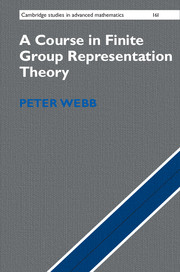Book contents
- Frontmatter
- Contents
- Preface
- 1 Representations, Maschke's Theorem, and Semisimplicity
- 2 The Structure of Algebras for Which Every Module Is Semisimple 15
- 3 Characters
- 4 The Construction of Modules and Characters
- 5 More on Induction and Restriction: Theorems of Mackey and Clifford
- 6 Representations of p-Groups in Characteristic p and the Radical
- 7 Projective Modules for Finite-Dimensional Algebras
- 8 Projective Modules for Group Algebras
- 9 Changing the Ground Ring: Splitting Fields and the Decomposition Map
- 10 Brauer Characters
- 11 Indecomposable Modules
- 12 Blocks
- Appendix A Discrete Valuation Rings
- Appendix B Character Tables
- Bibliography
- Index
11 - Indecomposable Modules
Published online by Cambridge University Press: 05 August 2016
- Frontmatter
- Contents
- Preface
- 1 Representations, Maschke's Theorem, and Semisimplicity
- 2 The Structure of Algebras for Which Every Module Is Semisimple 15
- 3 Characters
- 4 The Construction of Modules and Characters
- 5 More on Induction and Restriction: Theorems of Mackey and Clifford
- 6 Representations of p-Groups in Characteristic p and the Radical
- 7 Projective Modules for Finite-Dimensional Algebras
- 8 Projective Modules for Group Algebras
- 9 Changing the Ground Ring: Splitting Fields and the Decomposition Map
- 10 Brauer Characters
- 11 Indecomposable Modules
- 12 Blocks
- Appendix A Discrete Valuation Rings
- Appendix B Character Tables
- Bibliography
- Index
Summary
We recall from Chapter 6 that amodule is said to be indecomposable if it cannot be expressed as the direct sum of two nonzero submodules. We have already considered many indecomposable modules, but mainly only those that are projective or simple. An exception to this in Chapter 6 is that we classified in their entirety the indecomposable modules for a cyclic p-group over a field of characteristic p. To understand indecomposable modules in general might be considered one of the goals of representation theory, because such understanding would enable us to say something about all finite-dimensional representations, as they are direct sums of indecomposables. We will explain in this chapter that this goal is not realistic, but that nevertheless there is much that can be said. We try to give an overview of the theory, much of which has as its natural context the abstract representation theory of algebras. We can only go into detail with a small part of this general theory, focusing on what it has to say for group representations, and the particular techniques that are available in this case.
Our first task is to understand the structure of the endomorphism rings of indecomposable modules. This leads to the Krull–Schmidt Theorem, which specifies the extent to which decompositions as direct sums of indecomposable modules are unique. We go on to describe in detail the indecomposable modules in a particular situation: the case of a group with a cyclic normal Sylow p-subgroup.We next describe the theory of relative projectivity and discuss representation type, from which the conclusion is that most of the time we cannot hope to get a description of all indecomposable modules. Vertices, sources, Green correspondence, and the Heller operator complete the topics covered.
Indecomposable Modules, Local Rings, and the Krull–Schmidt Theorem
We start with an extension of Proposition 7.2.1.
Proposition 11.1.1.Let U be a module for a ring A with a 1. Expressions
as a direct sum of submodules biject with expressions 1U = e1 +· · ·+en for the identity 1U ∈ EndA(U) as a sum of orthogonal idempotents.
- Type
- Chapter
- Information
- A Course in Finite Group Representation Theory , pp. 213 - 256Publisher: Cambridge University PressPrint publication year: 2016



